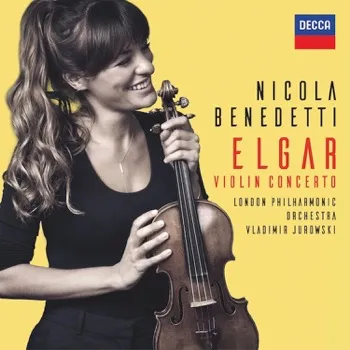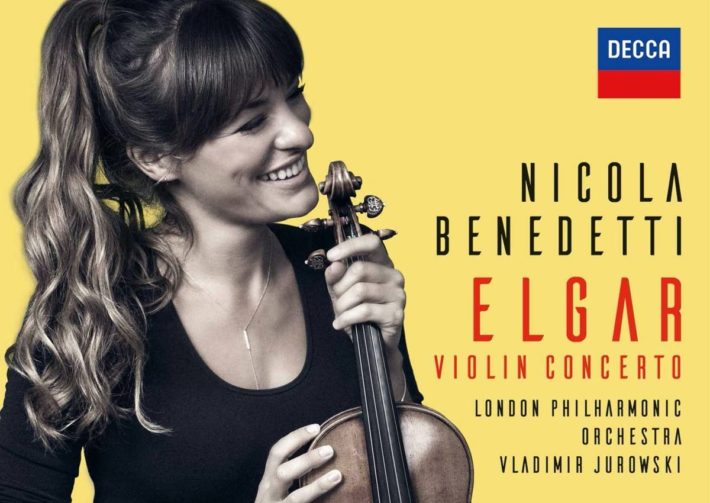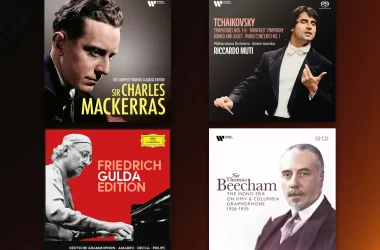Edward Elgar himself was an accomplished violinist, but strangely enough he composed only one concerto for violin. This work of over 50 minutes is rooted in the late-Romantic Germanic style, a weighty, dark and brooding affair. Any violinist will be aware of how the late composer, aged 75, envisaged the work with the teenager Yehudi Menuhin. Nicola Benedetti, a former pupil of the school established by Menuhin, bring a unique reading of this piece, together with Vladimir Jurowski and the London Philharmonic.

The extended opening orchestral exposition of the first movement has echoes of Elgar’s own recording with Menuhin. Jurowski treads with care and caution and the playing from the London Philharmonic is sufficiently detailed. Benedetti’s initial entry makes a statement: this is her interpretation, her moment to communicate, her chance to shine, and she strides on with a strongly rhythmic momentum. Where there are subtleties of tempo change, Jurowski clearly follows Benedetti, who is very clearly in the driving seat. Benedetti is impressively agile at changing her tone, from the heady vibrato-laden legato cantabile to the silvery chains of sound in the passagework, which sounds effortless, natural and spontaneous. The second movement is one of the quickest on record. Marked “Andante”, Benedetti comes in at almost one and a half-minutes under Menuhin and almost two minutes under Nigel Kennedy, who is one of the broadest.
Benedetti is more straightforward, with a strident feel that brings a range of different colors and emotions. Her vibrato is beautiful and used delicately, whilst Kennedy’s tone is much richer, almost indiscernible. Jurowski, on the other hand, is slightly over-cautious in the orchestral episodes, showing much restraint. The woodwind of the London Philharmonic are not particularly prominent, and the quicker tempo doesn’t allow them to execute Elgar’s markings fully. The brass, while possessing a pleasant sound, don’t quite elevate sufficiently out of the rich string textures in the climactic moments.
Benedetti brims with confidence throughout the final movement, in a self-assured and highly virtuosic reading. This is where I found Benedetti the most idiosyncratic, and in a good way. She is not afraid of taking risks, with a brisk tempo that molds the concerto and makes it something very much her own. Technically, the passages of running semi-quavers are executed with precision, showcasing the evenness and warmth of tone Benedetti can generate across the entire range of the instrument. Unfortunately, the woodwind and brass again don’t elevate sufficiently out of the denser textures, missing out on creating the Elgarian sound, as Vernon Handley crafts for Nigel Kennedy with the same orchestra, in Kennedy’s earlier version of this Concerto (1984).
Kennedy and Handley are intensely emotional, with broader tempo choices and making the most out of every detailed instruction. Tasmin Little and Sir Andrew Davis ride the waves of emotions with some of the biggest peaks, while Thomas Zehetmair is completely commanding with Sir Mark Elder. Benedetti and Jurowski bring something more emotionally restrained, and the conductor and the orchestra except more heartedly the accompanists role, letting Benedetti shine. While not as brisk as Zehetmair in the outer movements, Benedetti paces the concerto to bring a worthy, sometimes contrasting take that sits comfortably alongside these great Elgarian interpreters.
Completing the album is a selection of Elgar miniatures — “Sospiri”, “Salut d’amour” and “Chanson de nuit”, in which Benedetti is accompanied by pianist Petr Limonov. After the turbulent crests of emotion in the concerto, these intimate and delicate pieces are completely endearing and provide a fitting end to the album.
Elgar – Violin Concerto, “Sospiri”, “Salut d’amour” and “Chanson de nuit”
Nicola Benedetti – Violin
Petr Limonov – Piano
London Philharmonic Orchestra
Vladimir Jurowski – Conductor
Decca Classics, CD 4850949




















